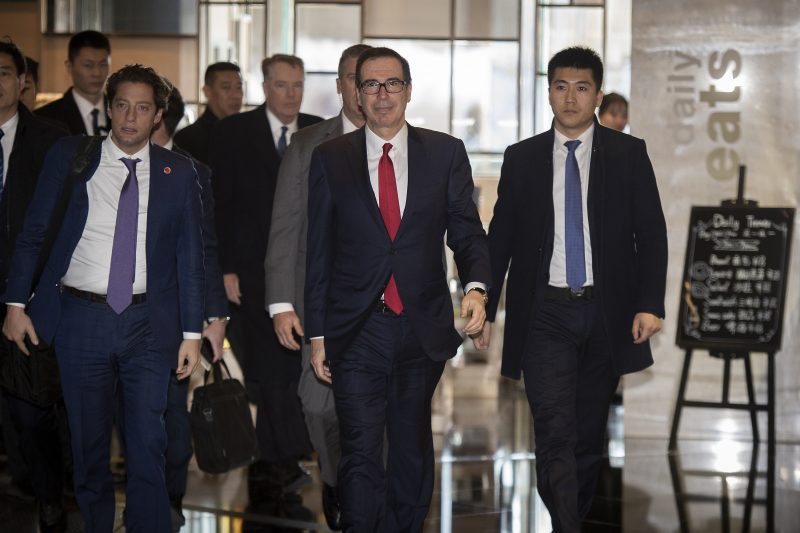Trump says could extend March 1 China tariff deadline
US Treasury Secretary Steven Mnuchin (center) and US Trade Representative Robert Lighthizer met China’s top trade negotiator, foreign minister and central bank chief (NICOLAS ASFOURI)
Washington (AFP) – President Donald Trump said Friday that trade negotiations with China were going “extremely well” and again offered the possibility of extending the March 1 deadline for a sharp rise in punitive tariffs.
Senior officials completed two days of high-stakes talks in Beijing on Friday as they try to avert the US threat to more than double tariffs on $200 billion in Chinese goods, which would be an unwelcome shock to the world’s second largest economy as it already has shown signs of slowing.
“It is going extremely well,” Trump said of the talks.
“The tariffs are hurting China very badly. They don’t want them and frankly if we can make the deal it would be my honor to remove them,” he told reporters at the White House.
The president confirmed his comments earlier this week that he might be willing to hold off on increasing tariffs to 25 percent from the current 10 percent, if Washington and Beijing are close to finalizing an agreement to deal with US complaints about unfair trade and theft of American technology.
“There is a possibility that I will extend the date,” he told reporters. “If I see we’re close to a deal or the deal is going in the right direction, I would do that.”
After progress in the talks in Beijing, a fourth round of negotiations is scheduled for next week in Washington.
Trump said he likes tariffs which are bringing “many billions of dollars pouring into our Treasury,” but continues to state that China is paying the duties, when in fact they are paid by US companies and ultimately by American consumers in the form of higher prices.
“The tariffs are hurting China very badly. They don’t want them and frankly if we can make the deal it would be my honor to remove them.”
– ‘The vibe is good’ –
Chinese President Xi Jinping hailed the “important step-by-step progress,” and said he hoped the two delegations would continue to “work hard” for a “win-win” agreement, according to China’s state news agency Xinhua.
Wall Street was cheered by the talks’ optimistic tone, with the benchmark Dow Jones Industrial Average up more than 350 points or 1.5 percent around midday.
American officials accuse Beijing of seeking global industrial predominance through an array of unfair trade practices, including the “theft” of American intellectual property and massive state intervention in commodities markets.
Since a December detente China has resumed purchases of some US soybeans and dangled massive buying of American commodities to get US trade negotiators closer to a deal.
The talks have included discussion of purchases to reduce the “large and persistent bilateral trade deficit,” the White House said in a statement.
But many China experts say Beijing’s Communist Party rulers are unlikely to make significant changes to industrial policies without a long and tough fight.
Still, expectations for an accord have been growing as China faces pressure from slowing economic growth.
“We all believe that China-US relations have broad common interests in safeguarding world peace and stability and promoting global economic prosperity and development,” Xi told the US negotiators.
US Trade Representative Robert Lighthizer, who led the American delegation, told Xi on Friday that while there was more work to do, they had made progress.
Lighthizer and US Treasury Secretary Steven Mnuchin and met with China’s top trade negotiator Liu He, Foreign Minister Wang Yi and central bank chief Yi Gang.
Bloomberg News reported that the White House was considering a 60-day deadline extension, but Trump did not offer any particulars.
Trump’s economic advisor Larry Kudlow said of the talks, “the vibe is good” but there was no decision yet on extending the 90-day tariff truce.
The two sides last year exchanged tariffs on more than $360 billion in two-way trade.
China’s politically sensitive trade surplus with the US last year hit a record $323 billion as tariffs kept Chinese buyers away from American agricultural and energy exports.
Trump has said that any eventual trade deal would need to be sealed personally with Xi, though no date has been set for a meeting.
burs-hs/ft
Disclaimer: This story is published from a syndicated feed. Siliconeer does not assume any liability for the above story. Validity of the above story is for 7 Days from original date of publishing. Content copyright AFP.


